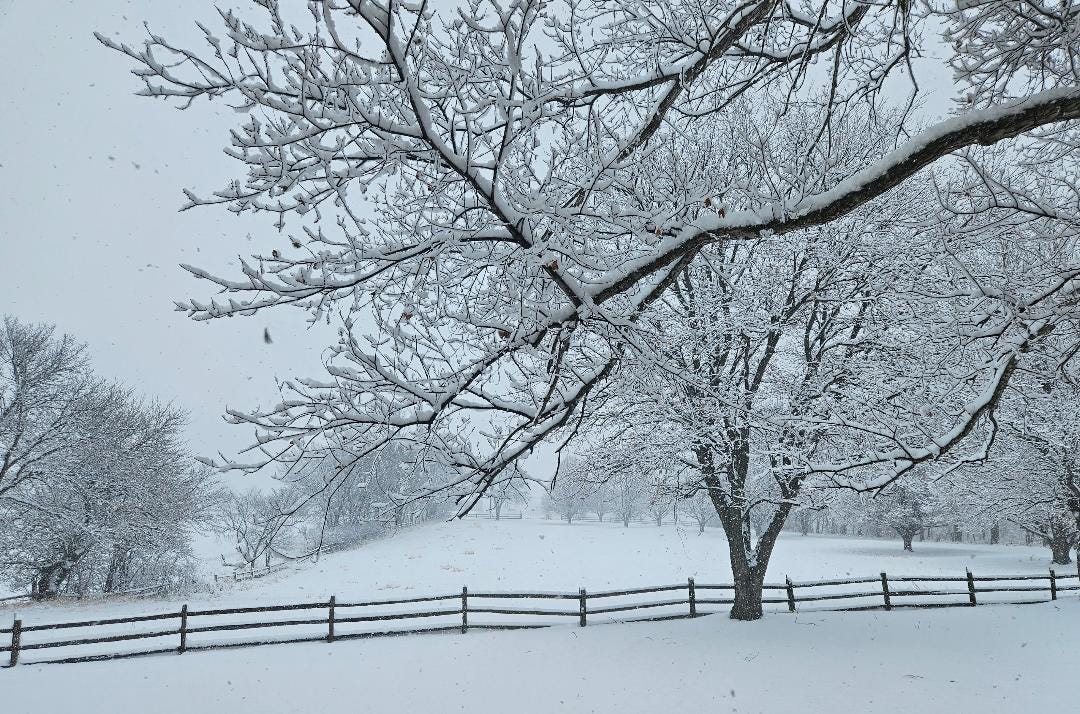Making Meaning
It’s snowing again, and the cashier at our local Fareway grocery store is looking out the glass doors at the parking lot.
“Did you order this?” she asks, nodding her head toward the wet late-winter flakes, which are coming down more rapidly by the minute.
“No,” I say. “Not me. I take no responsibility.”
I smile. She doesn’t. I realize this isn’t ordinary grocery store banter. This young woman is tired. And maybe not just because there’ll be more snow to shovel when she gets home.
Maybe she’s not just weary of winter. Maybe she’s weary of the world.
My late, wise friend Dorothy Cunningham introduced me to that phrase years ago—world weary. The feeling of overwhelm. Too much to do. Too much to worry about. A relentless barrage of saber rattling from voices in and around us. It’s a feeling that we have no time to breathe, to step back, to let go of catching up. No time to look out the window at the snowflakes and make meaning rather than more work.
That’s another phrase that’s lodged itself in my psyche: making meaning. An antidote. A connection. A space for our souls.
For years I partnered with my friend Diane Glass in offering a women’s program we called Tending Your Inner Garden. Diane and I modeled the program after the seasons, seeing them as symbols of where we are in our own lives. Each season had its value. Winter may have been the most valuable of all, as the time of lying fallow.
Iowa needs the cold winter weather to replenish the soil and re-activate nutrients. People need that too. But in a busy world where there’s constant pressure to produce, lying dormant can seem like a dream for someday, not a reasonable part of everyday life.
In fact, when Diane and I got together for lunch the other day, we talked about the pressures children are under to be involved in everything. Where is the down time? Where are the windows to look out of, letting your mind drift with the falling snow?
Where is the space between thought, between activities? The recovery time? Dormancy.
When I teach writing classes, we talk about something I learned from Judith Barrington’s book Writing the Memoir. Every story, she says, is made up of three elements: Scene, summary, and musing.
Scene is the building block of action. It’s the plot, seeing and hearing characters in action.
Summary is background, back story, the past.
And musing? That’s reflection, observation. It’s the author’s commentary about why the story matters. What it means.
If you write a story that’s heavy on scene but has no summary, you have a car chase—constant action that eventually leaves you breathless and spent.
If your story is long on summary but has no scene, it’s a textbook, plodding along with little vitality.
And if you write a story that’s devoid of musing, you miss the whole point.
I think life is like that, too.
We have a lot of car chases and textbooks in this world, but we seem to be low on true reflection. Despite all the commentary flying through cyberspace today, I’m not sure we take the time we need to find our own meaning.
What other people think is a poor substitute for what you believe. In fact, maybe nothing is more world wearying than being bombarded by the opinions of others, and then trying to find yourself somewhere in the shrapnel.
Finding meaning takes time, slowing down enough to create spaces and sit in their silence. Choosing not to Zoom through life, at least for a little while.
I have a friend who’s retiring in a couple of weeks, and she’s giving great thought to the space that her new life will provide. What does she want to fill it with? Does she want to fill it at all? After decades of work, marriage, child rearing and more work, is there space for....space? For more meaning?
What if we filled space with grace rather than grievance? Forgiveness rather than guilt? I know I sometimes keep busy to distract myself from regret or uncertainty. But that’s world wearying, too. In quiet, though—in making meaning—we can see something as gentle as a spring snow in ourselves as well as outside the grocery store windows.
Your inner landscape is waiting. If you’re feeling world weary, give yourself permission to rest in it for a while.
I’m honored to be one of the Iowa Writers’ Collaborative columnists.
Laura Belin: Iowa Politics with Laura Belin, Windsor Heights
Doug Burns: The Iowa Mercury, Carroll
Dave Busiek: Dave Busiek on Media, Des Moines
Art Cullen: Art Cullen’s Notebook, Storm Lake
Suzanna de Baca Dispatches from the Heartland, Huxley
Debra Engle: A Whole New World, Madison County
Julie Gammack: Julie Gammack’s Iowa Potluck, Des Moines and Okoboji
Joe Geha: Fern and Joe, Ames
Jody Gifford: Benign Inspiration, West Des Moines
Beth Hoffman: In the Dirt, Lovilla
Dana James: New Black Iowa, Des Moines
Pat Kinney: View from Cedar Valley, Waterloo
Fern Kupfer: Fern and Joe, Ames
Robert Leonard: Deep Midwest: Politics and Culture, Bussey
Tar Macias: Hola Iowa, Iowa
Kurt Meyer, Showing Up, St. Ansgar
Kyle Munson, Kyle Munson’s Main Street, Des Moines
Jane Nguyen, The Asian Iowan, West Des Moines
John Naughton: My Life, in Color, Des Moines
Chuck Offenburger: Iowa Boy Chuck Offenburger, Jefferson and Des Moines
Barry Piatt: Piatt on Politic Behind the Curtain, Washington, D.C.
Macey Spensley: The Midwest Creative, Iowa
Mary Swander: Mary Swander’s Buggy Land, Kalona
Mary Swander: Mary Swander’s Emerging Voices, Kalona
Cheryl Tevis: Unfinished Business, Boone County
Ed Tibbetts: Along the Mississippi, Davenport
Teresa Zilk: Talking Good, Des Moines
To receive a weekly roundup of all Iowa Writers’ Collaborative columnists, sign up here (free): ROUNDUP COLUMN
We are proud to have an alliance with Iowa Capital Dispatch.


